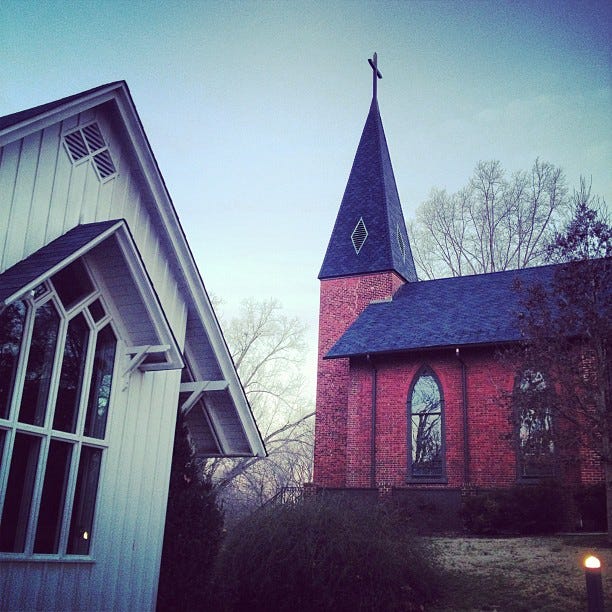Last weekend was a funeral.
The small church where I serve lost a central member. Maybe the central member. The whole community was gutted, grieving.
In the days leading up to the funeral, and all day on Saturday, every member of that church showed up, in many different ways. Prayers and calls and food and tears. Caring for the family and pulling together a beautiful service, worthy of a man of great faith.
They provided everything from beautiful music to parking logistics to online streaming of the service. We had 135 people in the very small sanctuary, plus overflow in the parish hall.
The next day was Sunday, and most members were back again. Because they needed to be. We were all exhausted and tearful, and together we worshiped and shared Communion. And we shared our faith, our prayers, and our love together.
All weekend long, we said it aloud: ‘I love you.’ ‘God loves you.’ ‘You are loved.’
We close thousands of churches every year in America - most of them small. Many - most? - small congregations struggle to keep up their membership and their buildings.
I think they’re worth saving.
I think the question is how.
The question is not why. I think we know how valuable small communities of faith are - to the members, to the community around those members, and to the church itself.
Small churches serve and live the Gospel in ways that magnify their presence far beyond the boundaries of their cities and towns. We need them.
But they’re trapped in an institutional system built for larger organizations that are themselves struggling to survive today.
They’re being crushed by expectations of how church is organized - a salaried clergy presence, the maintenance of a building and grounds, the reliance on members themselves for every bit of taking care of (and affording) it all.
Which is a key to how save them - innovative ministry works best in places where traditional ministry works least.
I’ve served with hundreds of churches - most of them small - as a Canon (assistant to the Bishop) in a diocese, as a consultant, and as a clergy person who loves them - for a quarter of century now.
This is how I think we can - and should - support small congregations into the future:
Ministry - Let the congregations lead! Clergy serve as ‘consultants’ - supporting members in their ministry, taking part as necessary. Personally, I don’t have a key to the building, I don’t know their budget, and I don’t think of myself as ‘in charge’. As a clergy person, I see my job as supporting, encouraging, and helping to grow the faith of those who are members. I think small congregations need help articulating their faith and claiming the ministries they already serve - the ways they already follow Jesus and share God’s love with those around them.
Money - Congregations need help utilizing their buildings for use beyond worship - renting space for gatherings, offices, or sharing with another worshiping community. They need help developing online membership - subscriptions. Churches need to be thinking of themselves as small businesses instead of non-profits. We need to understand - and value - the work we do together, the services we provide.
Yes - worship and gathering should always be free. But that does not mean that churches can’t develop income streams to support their ministry - and pay for help with things like groundskeeping, maintenance, and administration. Small congregations need help planning and executing new ways of financially supporting ministry.Technology - Small churches tend to be the least tech-savvy, and at the same time, can benefit the most from today’s technology. Things like online giving, church membership software, and social media are invaluable for lowering the workload, and for sharing the Gospel. The ability to connect with more people - to grow membership without losing the intimate nature of small communities - has never been easier than it is today. But this is where small communities often need assistance and don’t know where to find it, or even how to ask for it. Tech can be daunting. Small congregations need gentle help stepping into (or increasing) their presence in the digital world.
The church - and the world - needs the presence and power of small communities of faith. 20th century - based organizational systems are holding them back. Thinking big about supporting small congregations is part of the future of church.
We - clergy, other ministers, the larger church community - can help. I think we need to.






I like it. My salary as full time priest is paid almost fully by rental income of the church’s various rooms and buildings. The trick is making enough to also pay someone to manage all those rentals, so I still get to do ministry.
My small church was nesting inside the building of an even smaller church. They decided to make money by renting space. Soon after, they threw us out because a neighbor offered to pay more money so he could store his tools in the space where we were worshipping.